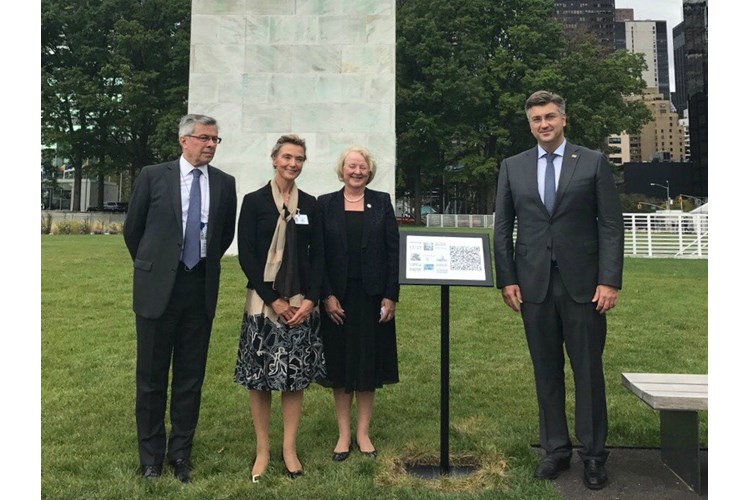


The plaque is the first of its kind to be installed outside a monument as part of the UN complex and contains a QR code which, when scanned by a mobile phone, shows that the monument was erected in 1954, that it symbolises peace and that its base is made of stone from the Croatian island of Brac. The monument is Croatia's gift to the world organisation.
The memorial plaque marked the 25th anniversary of Croatia's membership of the United Nations.
"For this generation of the Croatian people who have lived to see their country gain independence and sovereignty, May 22, 1992, the day when Croatia was admitted to the world organisation and when the first president, Franjo Tudjman, was here in New York, was the final act of the process of international recognition," Plenkovic said, adding that Croatia has positioned itself well in the UN in these 25 years.
"We have served terms on the Security Council, the Economic and Social Council, the Human Rights Council and the Peacebuilding Commission, and have participated in many UN missions. After being a recipient of security, now we contribute to world peace in partnership with regional organisations such as the EU, NATO and others," the prime minister said.
Croatia is trying to make its contribution to responses to megatrends faced by the world such as climate change, terrorism, migrations, poverty and economic challenges, he added.
On Tuesday, Plenkovic attended a meeting of the Global Pact for the Environment chaired by French President Emmanuel Macron.
"Croatia behaves responsibly and is a country that has, in the 25 years of its independence, understood global processes well and upholds the values of international law, good neighbourliness and peaceful settlement of disputes," Plenkovic said.
On Tuesday evening, the Croatian prime minister attended a reception arranged for heads of delegations to the UN General Assembly by US President Trump and one given by the European Union.
Croatian Prime Minister Andrej Plenkovic said on Wednesday the outstanding issues with Slovenia were not insurmountable, voicing hope that a solution would be found and confirming that he would meet with his Slovenian counterpart Miro Cerar in Zagreb next week.
Plenkovic spoke with Cerar on the fringes of the UN General Assembly in New York. He said they would meet in Zagreb on the 27th, that they wanted to make progress in relations between the two countries, and that a solution could be found through dialogue.
"We have a few outstanding issues but they are not insurmountable and I think we can arrive at a solution by honouring international law," he told Croatian reporters.
Asked to comment on Cerar's statement to the Slovenian news agency that they could talk only about the implementation of the border arbitration ruling which Croatia does not recognise, and not about a bilateral solution to the border issue, Plenkovic said Croatia's position remained that it wanted to resolve the land and sea border issue through dialogue.
"I think the message we wish to send to our partners in the international community is that we are mature and responsible enough to make a step forward in dialogue between Ljubljana and Zagreb," Plenkovic said.
On Wednesday, he had bilateral meetings with Kosovo President Hashim Thaci and Libyan Prime Minister Fayez al-Sarraj.
Speaking of Libya, Plenkovic said: "We want that country, with which we used to have diverse economic cooperation, to stabilise. That is important for Croatia because we want all our companies that left Libya in quite a rush in 2011 to return there and we want to reopen our embassy in Libya when the conditions have been created for that."
Plenkovic is scheduled to deliver a lecture at Columbia University on Wednesday and address the UN General Assembly on Thursday, when he will give Croatian views of challenges facing the contemporary world.
Text: Hina